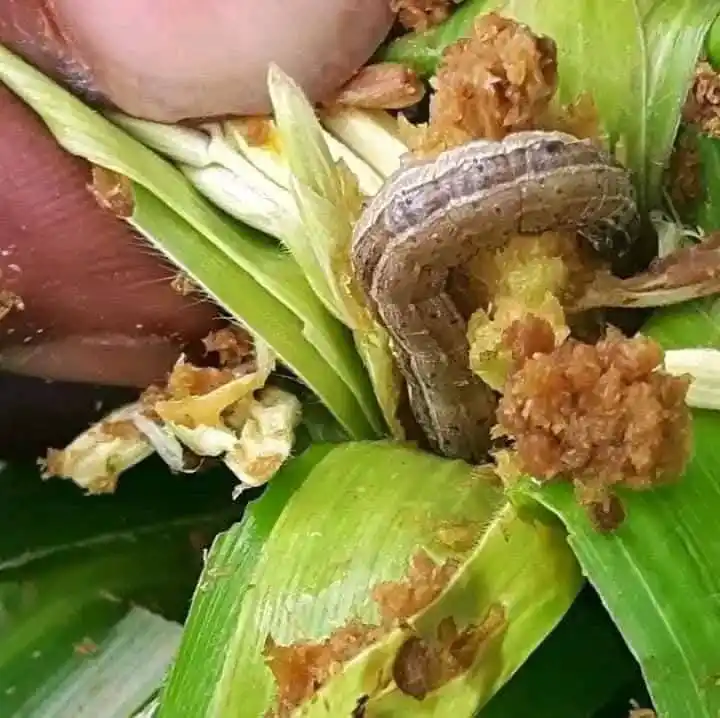
iMaDe FARMs
May 16, 2025 at 12:32 PM
*Maize farmers please pay close attention!*
*LET'S TALK about Armyworms 🐛TODAY!*
Armyworms, particularly the fall armyworm (Spodoptera frugiperda), can be a significant pest for maize (corn) farms. They are known for their voracious feeding behavior and can cause substantial damage to crops. This is what you should know about armyworms in maize farming:
🐛 Armyworms feed on maize leaves, silks, and kernels. Their feeding will always lead to reduced yields, poor crop quality, and even crop failure if infestations are severe.
🐛 Adult armyworms are moths, while the larvae (caterpillars) are the stage that causes damage. The larvae can be green, brown, or striped, and they often move in groups, which is why they are called "armyworms."
🐛 Beware of the *African Fall Armyworm!*
This highly destructive pest can wipe out 20% to 100% of a maize field. A single moth lays up to 1,500 eggs and migrates 100 km per night, making it a serious threat!
*Here is the life Cycle:* The fall armyworm goes through four life stages: egg, larva (caterpillar), pupa, and adult moth. The larvae are the damaging stage and can move in large numbers across fields, resembling a marching army.
Since FAW is resistant to many insecticides, the best defense is *Integrated Pest Management (IPM)*- using biological control, crop rotation, and selective pesticides to protect your harvest.
*Here are effective Management Strategies:*
Effective management includes a combination of strategies:
1. *Monitoring:* Scout your field regularly to detect early infestations.
2. *Biological Control:* Introducing natural predators or parasitoids. These are natural enemies you can introduce: trichogramma wasps, spiders, predatory beetles, birds, beneficial nematodes, such as Steinernema and Heterorhabditis, can parasitize armyworm larvae in the soil.
3. *Chemical Control:* Using insecticides, e.g., bifenthrin, cypermethrin, imidacloprid, methomyl etc, do this judiciously to avoid resistance development.
4. *Cultural Practices:* Crop rotation, removing crop residues, and planting pest-resistant maize varieties.
5. *Prevention:* Preventive measures include using pheromone traps for early detection, applying preventative insecticide treatments, promote practices that support natural enemies of the armyworm.
Proper management requires timely interventions and a comprehensive approach combining various control methods to minimize the impact on your maize crops.
🌿🌽🌿🌽🌿🌽🌿🌽🌽🌿🌽🌿🌽🌿🌽
Are you passionate about Maize Farming or would you love to learn how to turn your maize farm into a maize farming agribusiness?
We have put together 4 WELL DETAILED Maize/ Corn Farming PDF guide books that COVER EVERYTHING from PLANTING to HARVESTING to MARKETING!
You can NOW order the 4 Maize/Corn Farming e-books at the cost of one book via WhatsApp by following this link wa.link/nafs8b
You will as well get 2 BONUS books on Maize/Corn Farming and you will also be added in one of the iMaDe FARMs WhatsApp groups!
*THE TOPICS COVERED IN THE BOOKS ARE:*
🌽 Maize types and varieties!
🌽 Climate/soil requirements/soil testing!
🌽 Treatment of seed before sowing!
🌽 Site selection/land preparation!
🌽 Planting: date, seed spacing/depth/population
🌽 Irrigation and weed management!
🌽 Fertilizer/manure application!
🌽 Diseases, pests and control methods!
🌽 Harvesting and post harvest handling
🌽 Storage and record keeping!
🌽 Value addition/packaging & labeling!
🌽 Entrepreneurial skills, marketing E.T.C!
Learning with *iMaDe FARMs* 💚🤍🧡

👍
😮
4